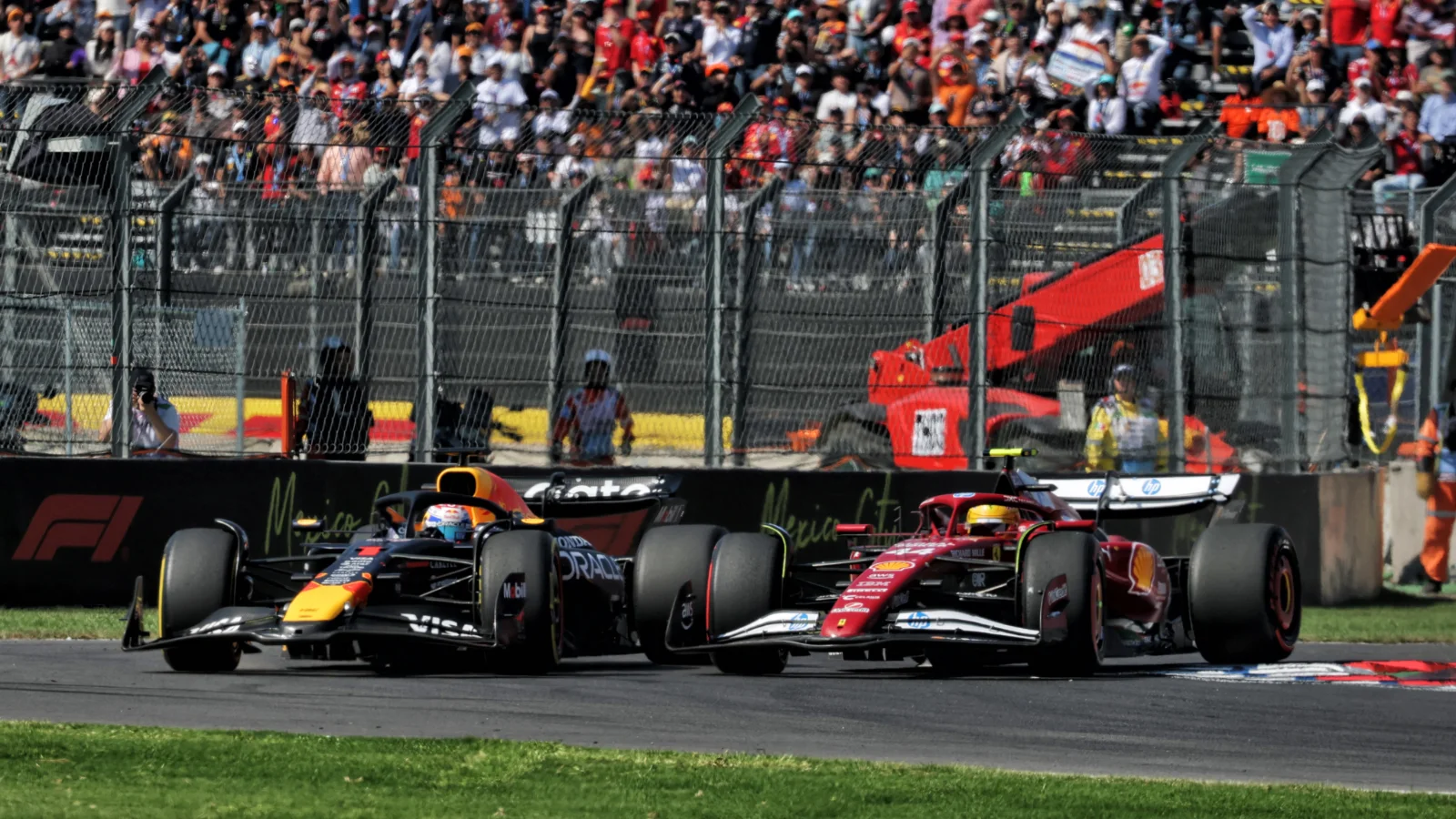In a sport defined by precision, speed, and the relentless pursuit of perfection, moments of raw, unvarnished emotion are rare, and all the more impactful when they occur. The Mexican Grand Prix, often a stage for high-altitude drama, recently delivered such a moment, but not from a breathtaking pass or a championship-deciding move. Instead, it was delivered over the team radio, laced with the kind of incandescent frustration that few have ever heard from one of Formula 1’s most composed figures.
Lewis Hamilton, the seven-time World Champion, is a man who typically reserves his public pronouncements for matters of social justice or diplomatic praise. Yet, during the heat of battle in Mexico City, a shocking and contentious 10-second penalty triggered an outburst that was as immediate as it was furious. His blunt, two-word assessment of the race stewards—“Unbelievable, these guys are unbelievable”— encapsulated not just his personal anger over a lost podium but the widespread and growing dissatisfaction with the arbitrary nature of F1’s regulatory system.
The controversy that saw Hamilton plummet from a strong third-place running to a disheartening eighth-place finish centers on a furious, wheel-to-wheel battle that reignited the embers of the intense 2021 rivalry between the British legend and his Dutch counterpart, Max Verstappen.

The Duel and the Deviation: A Contested Turn 4
The tension began early, erupting on Lap 6. Hamilton and Verstappen were locked in a high-stakes confrontation for position. The battle was aggressive, thrilling, and immediately problematic.
It began at Turn 1, where Verstappen executed an assertive maneuver that the Mercedes camp, and Hamilton, felt was over the limit, forcing the British driver wide. The fight continued through the next few corners. The decisive moment, the one that drew the attention of the stewards, occurred at Turn 4. Here, Hamilton attempted a daring overtake on the outside of Verstappen. However, the high-altitude nature of the Autódromo Hermanos Rodríguez circuit, which is notorious for low grip and tricky handling, betrayed him. Hamilton locked up his brakes, and with little choice left, he was forced off the track.
The rules are clear that a driver who leaves the track must not gain a lasting advantage. When Hamilton rejoined the circuit, he emerged ahead of Verstappen, setting the stage for the penalty. The stewards focused exclusively on this action at Turn 4, ruling that Hamilton “had left the track and gained an advantage by rejoining ahead of Verstappen instead of giving the position back or taking the escape road as the race director’s instructions required.”
The imposition of a 10-second time penalty, announced on Lap 18, was a crushing blow. It wasn’t just the fact of the penalty that sparked Hamilton’s rage, however; it was the chilling inconsistency of the decision-making process.
The Double Standard: A Tale of Two Incidents
The heart of the controversy, and the reason for Hamilton’s unprecedented outburst, was the differential treatment meted out to the two rivals. The stewards had indeed investigated Verstappen’s actions during the same battle—specifically, his aggressive moves at Turn 1 and a subsequent incident at Turn 3, where he too had gone off the track. On both occasions, the stewards declared “no further action” against the Red Bull driver.
From Hamilton’s perspective, the logic was fatally flawed: both drivers went off the track during the course of a single, chaotic battle, yet only one of them ended up with a race-altering punishment. He articulated his defense by noting that the low-grip conditions and the preceding aggressive racing had created a situation where going off at Turn 4 was virtually unavoidable once his brakes locked up.
This sense of unfairness was not limited to Hamilton. His former Mercedes teammate, George Russell, added a powerful voice to the dissent. Russell had been monitoring the opening laps and had already voiced his frustration over the team radio regarding Verstappen’s driving, particularly at the start. Russell’s scathing radio message—“Verstappen just cut the corner. The guy can just cut the grass and keep position, no penalty, no nothing”— highlighted that the perceived inconsistency was being noticed and condemned by other elite drivers from the very beginning of the race.
The context of the Mexican Grand Prix only deepened the sense of grievance. Mexico has historically been a stronghold for Verstappen, who boasts a commanding record of five victories in the last seven races held there. His comfort level allows him to push the limits of aggressive driving on the circuit, a hallmark of his successful—and often criticized—style. The central, urgent question Hamilton and others posed was whether the “limits” of racing etiquette were being applied uniformly to all competitors, or whether some drivers, particularly one with a history of success at that specific venue, were granted an unacceptable level of leniency.

From Podium Hope to Midfield Slump
The consequences of the stewarding decision were stark and definitive. Hamilton had qualified and was running in third place when the aggressive battle unfolded. Before the penalty, he was firmly on track for a crucial podium finish, a vital result in the tightening championship picture. By the time the 10-second penalty was served and the checkered flag waved, Hamilton had been demoted, crossing the line in eighth position.
In contrast, Verstappen, the driver Hamilton felt had initiated the series of contacts and had his own incidents investigated (and dismissed), ultimately finished on the podium in third place. The narrative, therefore, became an infuriating one for the Mercedes team: the driver who had been the victim of the perceived over-aggression was penalized out of the points, while the driver who set the aggressive tone claimed the spoils. The contrast between their final positions made the decision an immediate lightning rod for controversy, bringing back unwelcome memories of the intense, season-long squabbles over fairness from the 2021 title fight.
The Crisis of Consistency: An F1 Epidemic
The true significance of the Mexico incident transcends the final results sheet. It amplifies the ongoing, systemic challenge of consistent stewarding that continues to plague Formula 1. The stewards are tasked with making rapid, race-altering decisions based on complex rules and limited live information, forcing them to walk a tightrope between allowing exciting, “hard racing” and punishing moves that constitute an unfair advantage.
The debate is not about the difficulty of the job, which is universally acknowledged, but the unpredictable nature of its execution. Different panels of stewards, rotating from race weekend to race weekend, can often interpret ostensibly similar incidents in vastly different ways, leading to an environment where drivers feel they cannot clearly ascertain the boundaries of what is acceptable racing behavior.
Hamilton’s fury was genuine and deeply felt, stemming from the conviction that he had been treated unjustly. The fact that a respected and measured voice like George Russell’s echoed this sentiment confirms that this is not a singular case of a driver complaining about a penalty, but a collective concern within the paddock. Russell’s frustration over seeing a rival run off the track multiple times without consequence, while another driver is handed a heavy penalty for a single off-track excursion, perfectly captures the driver’s anxiety.
While the stewards may possess specific, detailed rationale for their decision on Hamilton at Turn 4 versus Verstappen at Turns 1 and 3, the appearance from the cockpit and the spectator stands is one of blatant inconsistency. It leaves drivers in a state of perilous uncertainty, unsure whether they can rely on the judgment to be the same from one lap, or one Grand Prix, to the next.

Looking Ahead: The Integrity of the Battle
As the Formula 1 calendar hurtles towards its conclusion, the ramifications of the Mexican Grand Prix stewarding decisions will loom large over the remaining races. Every future wheel-to-wheel battle will be judged against the controversial precedent set in Mexico City. Will the stewards maintain the highly punitive standard applied to Hamilton, or will they revert to the more lenient standard applied to Verstappen? The uncertainty creates a psychological burden on the drivers, forcing them to make split-second decisions not only based on physics but on a gamble on the subjective interpretation of the rules.
The incident has, predictably, sparked a vigorous, often heated, debate among fans and analysts about whether the current stewarding structure is truly fit for purpose. Calls for a fundamental overhaul are growing louder, with many arguing that transitioning from rotating panels to a smaller, more permanent team of stewards could inject much-needed consistency into the decision-making process.
Hard racing is, without question, the essence of Formula 1’s spectacle, the ingredient that draws millions of viewers worldwide. But for the sport to maintain its integrity, that spectacle must be policed in a manner that is transparent, predictable, and fundamentally fair to all drivers involved. The fire ignited by Lewis Hamilton’s angry radio message in Mexico City serves as a powerful reminder that the balance the stewards are constantly seeking remains elusive, and until it is found, the crisis of consistent officiating will continue to overshadow the purity of the racing itself.